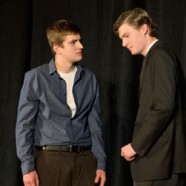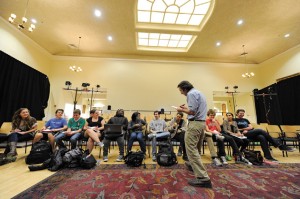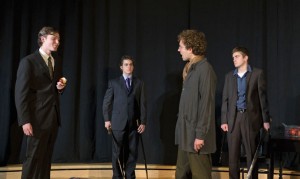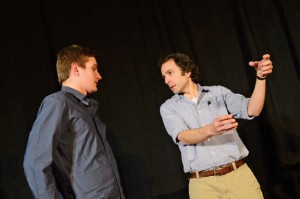
As the audience filters out of each 1212 performance, the final scene has yet to unfold. Peter Parisi, performing arts department chair and director, gathers the small cast and crew around him. Together, they absorb the evening’s performance before scattering to collect the congratulations. This moment culminates months of work—planning, auditioning, reading, memorizing, staging and rehearsing.
The play that Peter and company staged in February 2012 was Love and Intrigue by Friedrich Von Schiller, a German dramatist and major figure in German literature in the late 1700s. Peter came across an opera version and decided the dramatic, powerful story was just right. In the play, with overtones of Shakespeare’s Romeo and Juliet, Prince Ferdinand wants to marry Luise Miller, the bourgeois daughter of a fiddler teacher. Ferdinand’s powerful, sinister father and a beautiful and shrewd mistress stand in his way.
Auditions and Alchemy
In an intimate space in Kellner Performing Arts Center, just before Thanksgiving break, students audition for one of nine roles. At the table sits Peter’s student directorial team: Emilie Trehu ’12 and Adele Huughe (I). This is Emilie’s fifth 1212 play. “I respect their opinions and trust them,” says Peter.
A whirlwind of coordination, Peter makes quick decisions, pairs students up, hands out scenes, and sends them into the hallway to practice: “Feel free to take some risks,” he says. “Go practice and have fun!”
In twos and threes the students return and read through scenes. He switches some students’ roles or partners. Action is fast-paced and a few students stand out, such as Sage Warner (I), who will ultimately play Lady Milford, the prince’s mistress, and Caleb Warren (I), who will play the Chancellor, Ferdinand’s father.
 “Auditions help give us a clear picture,” says Emilie. “Along with what you expect to see, there are surprises. We give people direction to see how they take it. If they bristle, we know they won’t take direction well during production.”
“Auditions help give us a clear picture,” says Emilie. “Along with what you expect to see, there are surprises. We give people direction to see how they take it. If they bristle, we know they won’t take direction well during production.”
“It’s a complicated alchemy,” says Peter, deciding with his team who should be called back for the second round. “Does the student understand the words in front of him? Is she able to connect with her scene partners? Where do they fall in the big picture? Sometimes you’re comparing two strong actors. In the end, you have to go with your gut.”
Of the 18 students posted on the callback list, 16 appear for the second round. During another long afternoon of scene readings, Peter gives a bit more direction: “I want to see what you are thinking. Control your physicals. Use the space and walk around.”
The hardest part for Peter and his team is assigning the nine roles. Once the fi nal cast list is posted on the door, it’s time to get on with the show.
Practice and Progress
After Thanksgiving break, rehearsals begin. With no set yet, standing on the raised fl oor that curves along the outside wall of Wigg, actors clutch scripts and read scenes, their interactions stilted and tentative. “This text is challenging and dense,” Peter says. “Be kind to yourselves; getting through this will take time.”
The “dense” text moves through passion, anger, betrayal and death. Scenes can call for physical ardor and violence—heavy 44 Milton Magazine material for teenagers, but Peter treats his students like professional actors. They will be together every day until performances in late February. He pushes them to work hard, but he also keeps the atmosphere fun.
“We laugh a lot. We use humor,” says Peter. “I try to be respectful of their time. Some days I sense they are tired and I’m tired, so I just let them go for the day.”
Peter is a ball of energy, often surpassing his students’ pace. As they work, he elicits their feedback on the lines—sometimes changing or deleting words and paragraphs because they sound awkward, repetitive or overwrought. During this phase, Peter sometimes interrupts after every line. Getting through one page of script can take an hour.
“What are you thinking at that moment that line comes out?” he asks constantly, prodding the actors to probe their characters’ motives and thoughts.
 Progress means moving from reading lines to working on entering scenes and blocking movements around the stage. In the first scene, the young Ferdinand (Sam Audette, Class I) enters the house of the pious and pure Luise Miller (Cary Williams ’12). In this scene, Luise rushes over to Ferdinand and they embrace. Their first attempt is so awkward that everyone bursts into laughter. They will redo this entrance over and over in the weeks to come until the embrace is natural and conveys the love between these characters.
Progress means moving from reading lines to working on entering scenes and blocking movements around the stage. In the first scene, the young Ferdinand (Sam Audette, Class I) enters the house of the pious and pure Luise Miller (Cary Williams ’12). In this scene, Luise rushes over to Ferdinand and they embrace. Their first attempt is so awkward that everyone bursts into laughter. They will redo this entrance over and over in the weeks to come until the embrace is natural and conveys the love between these characters.
“Feeling a scene work is great,” says Cary. “When we first did it well, we both felt it, and we knew why and how it worked. Those are really rewarding moments.”
Eric Bohn ’12, playing the flamboyant palace aide and gossip Hoffmarschall Von Kalb, relishes the role. Eric is comfortable onstage, but Peter wants to tamp down some of the excess.
“You’re still figuring out how he moves and sounds,” says Peter. “I appreciate the experimentation. I would take him down a notch or two, but I like how you are taking a risk.”
Eric listens and redoes the scene.
“I like the more subtle choices. This is more honest,” Peter tells Eric. Peter does not hold back the critiques, which are both funny and dead-on. He moves around the room, tossing out bon mots with exaggerated flair.
“No, you are giving me crazy Muppet.”
“Why do you sound like Maya Angelou reading a poem?”
“Boring!” he yells after emitting a loud snore.
“Mr. Parisi shows you how you are doing it wrong, in a fun way. Then you get to choose the right way to do it. It’s more effective than his just saying ‘I think you should do it this way,’” says Caleb.
Peter is also generous and detailed with his praise. Natalie Solomon ’12, a seasoned Milton actor and production team member, plays Frau Miller, Luise’s mother.
“I like what you are doing here,” Peter tells her. “You are really listening to her, which is good because you are her mother. You were fantastic. That was a touching moment.”
Peter works hard to help the actors understand the subtext of their lines and how gestures can communicate what isn’t spoken.
“The audience only gets one shot. They don’t have the text in front of them,” says Peter. “You have to understand what you are saying and convey that.”
The play contains many long monologues, and rehearsals focus attention on these.
“My role is manipulative, assuming and arrogant,” says Caleb, who has a few intense monologues. “For me, memorizing the lines are a major hurdle, but as I’m getting over that, the lines are coming out more naturally.”
 Peter gets the actors into their characters’ heads. “He’s an awful, awful person,” Peter tells Rick Dionne (III) of his character. “He has such rage. Just think of his name: Wurm. The way people look at him and treat him. He’s a sociopath if there ever was one.”
Peter gets the actors into their characters’ heads. “He’s an awful, awful person,” Peter tells Rick Dionne (III) of his character. “He has such rage. Just think of his name: Wurm. The way people look at him and treat him. He’s a sociopath if there ever was one.”
A scene between the Chancellor and his son Ferdinand gets physical, calling for Caleb to grab Sam by the neck and push him down. They redo the scene over and over under Peter’s watchful eye.
“Think about how you move, the intensity, the pace. Right now I’m watching Sam and Caleb, not the characters, and that is boring.”
Peter treats all the roles as important. Conrad Tyler (III), a new actor, plays the Chancellor’s page, a minor role. His character announces visitors and takes capes and hats. Peter shows Conrad how his tone in announcing a character, or his reaction to holding Hoffmarschall’s scarf, can add subtext.
After winter break, the cast confronts the biggest challenge yet: going “off book.” At first, holding their scripts is permitted, but only for a necessary look. The next week, without scripts, many actors aren’t sure what to do with their hands. They call for lines when they forget; Adele reads them for the actor to repeat. While working on remembering their lines, many speak softly and their characters’ emotions are missing. Confidence does grow, and actors start to project.
Props begin to appear on the set. 1212 is known for the sparse sets: a table, a few chairs, pens and paper on a desk. The simple props add to the action without overwhelming it.
“I love that the 1212 is less about staging and more about the character’s roots and the acting itself,” says Eric. “This gives way to truer emotions and moments that feel very real to us and to our characters.”
The bar is raised another notch in rehearsals, and the actors can no longer call for lines.
“If you are struggling for a line, think about what you want to say in this moment with this person, and it will come to you,” says Peter. “Make sure you are listening to each other.”
During the week of the performances, “run week,” major and minor decisions must be made regarding costumes, music and lighting. Flyers are designed, printed and hung around campus by the actors. Tickets are “sold” during lunches at Forbes.
“This is the most stressful time,” says Emilie. “We still want to get so much done. But it will come together. It always comes together.”
At the dress rehearsal, they fi rst run through the beginning and ending of each scene to check scene queues, shifts and prop placement. Then Peter gives the command: run the play from beginning to end.
“This is a rehearsal. We might stop, but I hope we don’t have to.”
Peter perches in different audience seats, taking notes. At the end he goes over the notes and the actors write down his pointers in their notebooks. He notes lines that worked and that didn’t. He reenacts scenes to show them how they need to play. By 10 p.m., it’s a wrap, and the actors need to finish any schoolwork and get some sleep before the next day’s classes.
Show Time
Friday night, the second of three consecutive performance nights, brings heavy rain. More than 100 people—faculty, students and parents—wait in the hallway for the doors to open. The room fills with chatty and excited energy.
Lights dim, the music is cued and Act One unfolds. Ferdinand’s love for Luise is written on his face. Frau Miller and Miller (Oliver Bok, Class I) banter and bicker like an old married couple. Lady Miller, regal and confident in her black lace dress, also conveys her vulnerability and sadness. The Chancellor towers physically over everyone, a looming, menacing presence. The Hoffmarschall is all color and wit while Wurm oozes around the stage, a terrifying character. All the actors have nailed down how to communicate with their eyes and gestures. As Act One concludes, the story’s intensity sits heavy on the silent audience.
At the end of Act Four, emotion leadens the air as the Chancellor weeps over two bodies: his son Ferdinand has poisoned Luise and then himself. At the close, the audience bursts into applause. The cast, drained from the rigor of the performance, but glowing and proud, lines up for their bow.
When everyone but the cast has dispersed, Peter gathers them to review the night’s performance. “What moments were positive, effective?” he asks.
The actors, in turn, graciously praise their peers for particular scenes and chemistry. The actors will take these thoughts into their final performance the following night. “I was so pleased with the casting and how the play turned out,” says Peter.
“I was pleased by how the students understood and embraced the words and language, how they understood the literature and then made choices to bring it to life. One moment in rehearsals, I asked Caleb how he was tapping into his feelings toward his son Ferdinand and he answered, ‘Because I see his mother.’ Well, the script never refers to the mother! That’s the kind of leap you want an actor to make. Ah, yes!”
–Liz Matson



